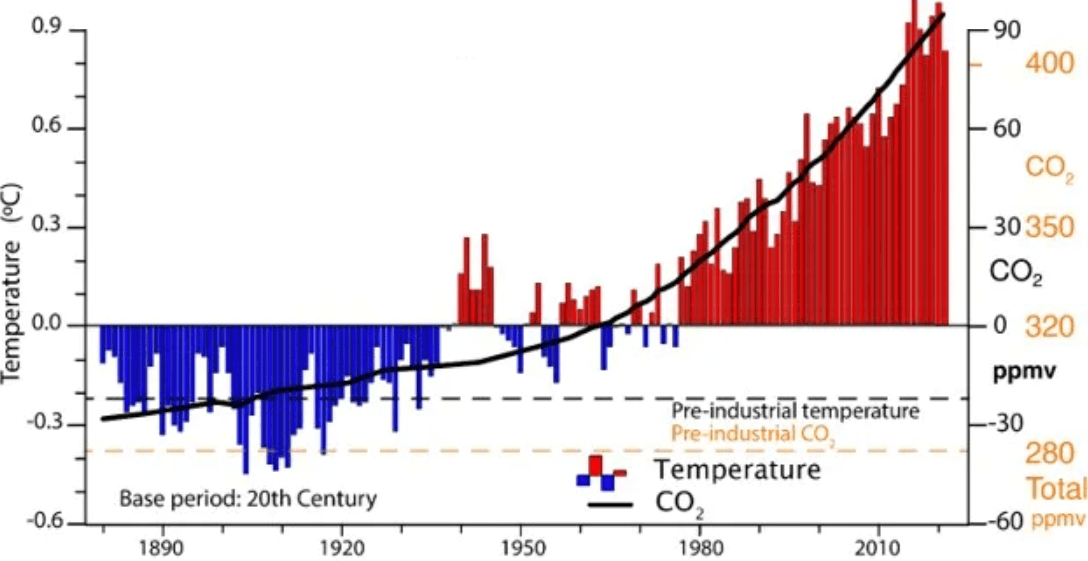
Why have so many climate change deniers emerged as anti-vaxxers during the pandemic, and why are so many people listening to their false fairytales, asks Dr Kevin Trenberth of Auckland University
Scientists have come out in force this week to pour scorn on misinformation about climate change science espoused by Canadian psychologist Jorden Peterson on The Joe Rogan Experience podcast last week.
Rogan, who regularly attracts 11 million listeners to his Spotify-based show and so could be considered a powerful influence, did not appear to challenge his guest’s unfounded claims during the interview. What’s more, Rogan is also in the news this week over false claims it is said he makes frequently on his podcast about Covid and vaccines.
It is perhaps no surprise that climate change deniers, those who deny the existence of human-induced global warming, have also emerged strongly in the Covid-19 era as anti-vaxxers.
The growth of deniers has occurred especially as social media has exploded. In the past century, we had generally strong relatively centralised sources of information for the public through newspapers, radio and television, and all articles were reviewed and edited. With the growth of Facebook, Twitter, and other forms of social media, anyone can spout their own opinions, and have their own cronies reinforce their views. No vetting required. No bothersome concern about facts.
As a climate scientist, I have been at the forefront of research and expounding on the growing issues with climate change arising from human activities, in particular increasing carbon dioxide and other greenhouse gases in the atmosphere. The latter interfere with the flow of infrared radiation back out to space from our planet and trap energy, creating heating of Earth and climate change.
Scientific understanding of the climate change problem continues to grow but has been well understood for many decades now. It was in the 1970s that clear evidence of global warming emerged, as global mean surface temperatures climbed outside the natural variability exhibited in the past record. (See figure below).
Clear observations of warming of the top 1000m of the ocean became evident in the 1980s, and below that level in the 1990s. Melting glaciers and ice sheets, such as in Greenland, also became abundantly clear and both contributed to sea level rise of over 90mm since global altimetry measurements from space were implemented in late 1992.
Global mean surface temperature and carbon dioxide concentration
This figure illustrates the link between the annual values of carbon dioxide and global mean surface temperatures. The pre-industrial values are indicated by dashed lines and the base (zero) value is the 20th century average. Interannual variability in temperatures occurs from weather and El Niño. In the 1970s the increasing trend exceeds the variability.
The basic science and knowledge of human-induced climate change was well established by 1988 when the Intergovernmental Panel on Climate Change (IPCC) was established. But the IPCC assessments are consensus reports involving scientists from all over the world, and are inherently very conservative. It was not until the 2007 Fourth Assessment, in which I played a major role, that global warming was declared “unequivocal” and recent reports in 2013 and 2021 have only reinforced but not altered the basic assessment information.
Global warming is undeniably happening.
Finding this clear evidence to validate the theory of climate change is important and the combination of theory, observational evidence, and physical understanding (and modelling) creates a set of facts that make the case for societal actions. Certainly, there are important details to be better understood and scientists are sceptics of certain aspects. But increasingly, some people are not just sceptical of the details but outright deny sound evidence: the theory and observations.
It was supposedly the statistician George Box who initiated the concept that "All models are wrong; some are useful." It's not just true for statistical models, but for physical ones as well. We know without a doubt that Newton's theory of gravity is wrong. It ignores the crucial behavior of objects travelling near the speed of light. But it works very well for all practical purposes, including launching the James Webb Space Telescope to the L2 point, the second Lagrange point, some 1.5 million km from Earth.
I have been involved in numerous rebuttals of denier commentary, often in the form of written peer reviewed papers. I was heavily involved in Climategate in the UK in 2009 when hackers stole thousands of emails, including hundreds of mine, from the University of East Anglia’s Climatic Research Unit computer.
One of my emails went viral and was used as the subject of a number of radio talk shows and newspaper articles. Protestors appeared at my institution, the National Center for Atmospheric Research in Colorado, but it was mid-winter, cold and snowy, and they did not last long.
From 2007 to 2010 I wrote nine reviewed and edited commentaries on new papers and subjects relating to climate change, which in part led to the establishment of a new Nature journal Nature Climate Change. Afterwards I wrote several edited blogs for The Conversation, which publishes contributions written mainly by academics for the general public. Many of these are on my website.
However, most of this was before the development of social media, and I have not signed up to that as a platform at all. I do not tweet, do Facebook, or participate in any other uncontrolled social media. I have been crucified on occasion at denier websites, but mostly I ignore them. I just wish more people would do the same.
So, back to Rogan and Peterson and the growing band of deniers who use these social media channels and their very powerful influence to make false and dangerous claims, whether about climate change or vaccines or disease of pandemic proportions: Yes, science does not know everything, otherwise it would stop. But this does not mean you can fill in the gaps with whatever fairy-tale most appeals to you and pass it off as fact.








